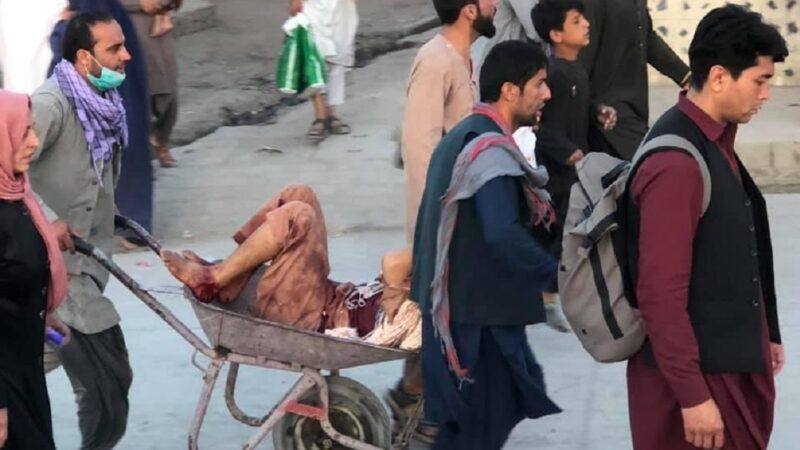Kabul Attack Is a Vivid Reminder of Why America Should Leave Afghanistan ASAP
The Pentagon says 12 Americans were killed and 15 more wounded in a pair of suicide attacks near the Kabul airport. At least 60 Afghans died as well.

Dozens were killed and more than 100 injured in a pair of suicide bombings targeting American troops and Afghan civilians gathered near the perimeter of the Kabul International Airport on Thursday.
According to the Pentagon, 11 Marines and one Navy medic were killed in the blasts and another 15 American military personnel were wounded. An Afghan official told The New York Times that at least 60 civilians were killed and more than 100 injured.
Gen. Kenneth McKenzie said today that the U.S. military is continuing its mission to withdraw from Afghanistan before Tuesday. "While we're saddened by the loss of life, both U.S. and Afghan, we're continuing to execute the mission," said McKenzie, commander of U.S. Central Command, during an afternoon press conference.
That's the right response. The awful scenes from Kabul that have dominated the American news media today are a reminder of the reasons President Joe Biden is right to pull U.S. troops out of the country as quickly as possible. They are a vivid illustration of the bloody civil war that's gripping Afghanistan—a war that the United States cannot stop and should not participate in.
Thursday's suicide attacks were carried out by members of the Islamic State Iraq and the Levant—Khorasan Province (ISIS-K), an offshoot of the Islamist organization that sought to form a caliphate in the Middle East during the final stages of the Iraq War. In Afghanistan, ISIS-K has been engaged in a bloody battle with the Taliban for control of the country for years.
Thursday's attacks was neither unique nor unprecedented—though they certainly received far more attention in American media than similar assaults in recent months. The U.S. believes ISIS-K was responsible for a May 2020 attack that killed 24 at a Kabul hospital and for an attack in May of this year that killed 90 at a school in the same neighborhood. (The group did not claim responsibility for either attack.) Despite years of efforts by American and Afghan forces, the ISIS offshoot "is still quietly entrenched, mostly in the country's east, and is waiting for an opportunity to reassert itself," The New York Times reported in May.
This was the 25th terror attack in Afghanistan since the beginning of last year and the first that is getting more than passing mention in the US press.
They included an attack on a maternity ward that killed 24 and another attack on a school that killed 90.
— Joshua Holland (@JoshuaHol) August 26, 2021
Meanwhile, as the Taliban have been taking control of jails formerly controlled by the Afghan government, they reportedly have summarily executed ISIS-K leaders who were locked up.
It's becoming more and more apparent that the true struggle to control Afghanistan after the withdrawal was never going to be between the Taliban and the American-backed government that collapsed earlier this month. It's the Taliban versus other Islamic groups. The script has flipped with stunning speed: McKenzie said Thursday that the U.S. military is now coordinating with the Taliban to secure the roads and neighborhoods around the Kabul airport, where evacuations of Americans and Afghans continue.
"I cannot and I will not ask our troops to fight on endlessly in another country's civil war," Biden said two weeks ago, shortly after the Afghan government collapsed and the Taliban took control of the country. That civil war, which most Americans probably paid no mind until it arrived at the threshold of the Kabul airport on Thursday, has been and will continue to be a violent and bloody affair.
That's why Thursday's tragic events should only steel American resolve to leave the war-torn country. There is nothing to be gained by leaving U.S. troops in harm's way.


Show Comments (513)